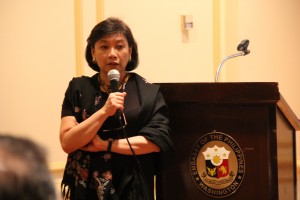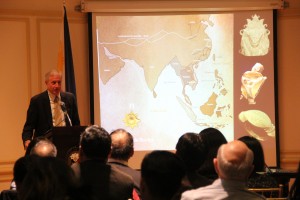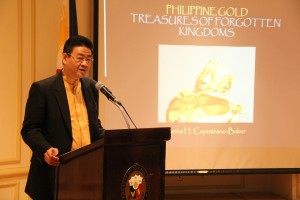Lecture on ancient PH gold held in Washington

Dr. Florina Capistrano-Baker delivers her lecture on Philippine Gold: Treasures of Forgotten Kingdoms on 14 October 14 at the Philippine Embassy in Washington, DC. The lecture was a supplement to an ongoing exhibit in New York Citry of gold objects from pre-colonial Philippines at the Asia Society in New York. PH EMBASSY PHOTOS
WASHINGTON, D.C.— Members of the Filipino community and the general public had the opportunity to learn more about gold from ancient Philippines during a lecture on by Dr. Florina Capistrano-Baker on October 14 at the Philippine Embassy.
The lecture, Philippine Gold: Treasures of Forgotten Kingdoms, was a supplement to an ongoing exhibit in New York City of gold objects from pre-colonial Philippines.
The exhibit is co-curated by Dr. Capistrano-Baker, consulting curator at the Ayala Museum, and Adriana Proser, John H. Foster Senior Curator for Traditional Asian Art at the Asia Society.
During his opening remarks, Patrick Chuasoto, deputy chief of mission, likened the traits of the rare, precious metal to that of Filipinos.
“What most people do not know is that gold is the most malleable of all metals. It easily bends to external forces without breaking or cracking. It changes form yet it is able to retain its natural properties,” stated Chuasoto.
Article continues after this advertisement
Hank Hendrickson, Director of the US-Philippines Society, delivers his closing remarks during the the lecture on Philippine Gold: Treasures of Forgotten Kingdoms on 14 October 2015 at the Philippine Embassy in Washington, DC.
“Viewed this way, gold can symbolize the essence of being Filipino. As individuals and as a nation, Filipinos are recognized for their resilience, for the ability to adapt and assimilate while preserving what is true about themselves,” Chuasoto added.
Article continues after this advertisementDuring the lecture, Capistrano-Baker shared the history of Butuan in southern Philippines, a polity which rose to commercial prominence in the 10th century and declined in the 13th century. Butuan was home to various gold objects, primarily elite regalia believed to be part of a ruling family’s collective heirloom wealth.
Members of the audience marveled at the beautiful and intricate designs of the gold pieces, most of which were smaller than a palm of a hand. According to Capistrano-Baker, the technically astounding works are indicative of excellent skills and craftsmanship present long before the arrival of the Spaniards in the Philippines.
Capistrano-Baker’s talk was followed by questions from audience members eager to learn more about the gold items and their history.
The lecture was organized by the US-Philippines Society with the support of the Embassy.
Hank Hendrickson, executive director of the US-Philippines Society said, “The program on pre-Hispanic Philippine gold showcased intricate designs, revealed complex social structures, and expansive trade ties throughout the Philippines from the 10th to 13th centuries, an era that has been largely lost in history until now. The US-Philippines Society is delighted to assist bringing more information on that period to American audiences and encourages people to visit the exhibit at the Asia Society Museum in New York.”

Minister Patrick Chuasoto delivers his opening remarks during the lecture on Philippine Gold: Treasures of Forgotten Kingdoms on 14 October 2015 at the Philippine Embassy in Washington, DC.
Capistrano-Baker received her PhD, M.Phil., and M.A. from the Department of Art History and Archaeology in Columbia University. She curated the permanent exhibition of Gold of Ancestors at the Ayala Museum in 2008, and wrote the catalogue Philippine Ancestral Gold in 2011. She is the recipient of numerous awards including fellowships from Columbia University, the Metropolitan Museum of Art, Asian Cultural Council, Ford Foundation, American Association of University Women, and the Getty Research Institute.
The exhibition Philippine Gold: Treasures of Forgotten Kingdoms is composed of over 100 gold items, mostly regalia, jewelry, ceremonial weapons, and ritualistic and funerary objects accidentally discovered in 1981 in the hamlet of Magroyong near Butuan. These objects are on display at the Asia Society Museum at 725 Park Avenue New York, until January 3, 2016.
Like us on Facebook